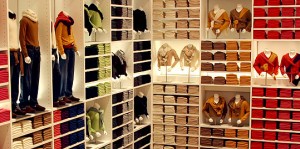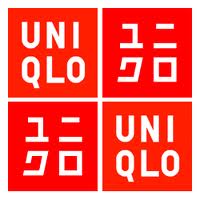Uniqlo is a Japanese clothing retailer with an unconventional marketing strategy. Unlike other successful H&M, Topshop, and Zara, Uniqlo does not produce ‘fast fashion’ to be worn and disposed of each season. Instead, it produces basic clothing in limited styles, and keeps costs low by preordering huge volumes of clothing many months in advance to be produced in Chinese factories.
I find their approach unusual because instead of having a target segment and making clothing to suit the segment’s specific tastes like most clothing retailers, they’ve chosen to focus on providing generic clothing for virtually everyone. It goes against a lot of what we’ve learned in class, and yet the company has been enormously successful. I think, though, that in this case the company’s generality is part of what makes them so distinctive.
What makes Uniqlo different from similarly priced retailers is not only the simplicity of the clothing, but also the quality and innovative technology of its fabrics. Clothing made of Heattech fabric provides lightweight insulation, while tops in the Airism line have special fibres that keep you cool and dry in hot weather. The company’s mass production schedule of a few styles allow it reduce costs enough to be able to invest more on the quality of fabrics, so that it can sell items like pure cashmere sweaters and Japanese selvedge jeans, both typically high ticket items, at affordable prices. In this way, it’s created an image that straddles the line between quality and budget. Limited edition collections with designers like Jil Sander have added to its higher end appeal, which has left Uniqlo as a bit of a brand oddity in clothing retailers. It’s an in-between that attracts both the quality seekers and the budget conscious.
Altogether, Uniqlo has created a distinctive brand identity by favouring functionality over fashion, and quality over individuality. Its positioning has so effective that the company now has more than 950 stores worldwide and has made Tadashi Yanai (the founder/CEO of Uniqlo) the richest man in Japan. Soon, the company may even take over Inditex as the biggest retailer in the world, showing that perhaps consumer tastes in clothing may be simpler than it seems.



